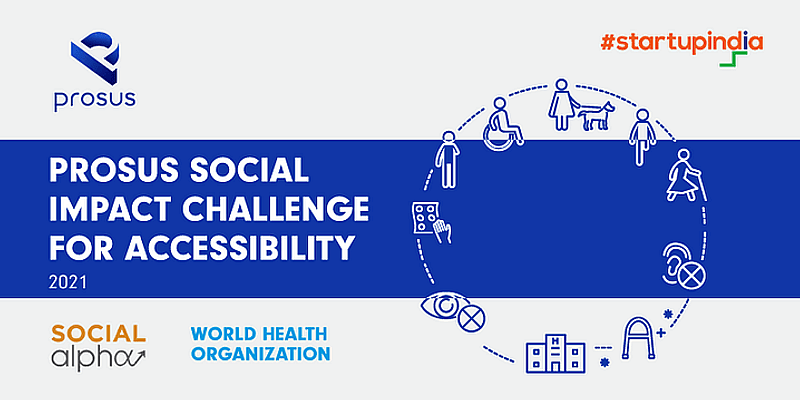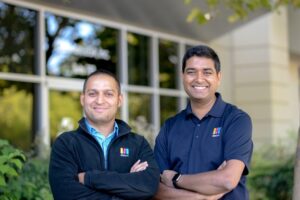One billion people need assistive products today and more than two billion will need at least one such product by 2030, according to WHO.
At this scale, access to assistive technology is an issue of public health. More practical support would improve access to public life and enhance employability for people with disabilities. It is, then, in the interest of the government and the private sector to do more.
That is the view of disability activists and specialists in rehabilitation and employability; it is also an organizing principle at Prosus, the global consumer internet group of Naspers, which is hosting the second edition of its Social Impact Challenge for Accessibility.
Created last year by Prosus in partnership with Invest India, Social Alpha, and WHO, the SICA initiative invites Indian startups with promising ideas in assistive technology to compete for an annual grant and access to the Prosus SICA mentorship programme.
The initiative comes at an opportune moment. Activity in assistive products is currently limited and specialized, primarily serving high-income markets, says Dr Padmaja Kankipati, who has been working in the field of rehabilitation for the past thirteen years and holds a PhD in rehabilitation science. The focus of her work is assistive technology service provision, predominantly wheeled mobility, and seating devices. She currently serves as a technical officer, assistive technology, with WHO- South East Asia Regional Office.
On a visit to India during her PhD at the University of Pittsburgh, she saw the dearth of choices for wheelchairs. Users accepted what was available, a dilemma for those who could not afford expensive imports. The local choice was a single variety of clunky chair suited for rough roads and towns and villages lacking pedestrianised areas. Back in Pittsburgh, she decided to apply her expertise – and respond to an obvious gap in the market – by creating low-cost customizable wheelchairs that “could be as unique to the individual as medical prescriptions.”
Dr Kankipati represents WHO on the Prosus SICA jury. WHO coordinates the Global Cooperation on Assistive Technology (GATE) initiative towards realizing the UN’s Sustainable Development Goals. GATE aims to support countries in addressing challenges and improving access to assistive products in their markets. In its role as a partner to Prosus SICA, WHO is providing technical assistance to startups to scale up for global markets.
“India cannot afford ignorance,” says Arman Ali, executive director of the National Centre for Promotion of Employment for Disabled People (NCPEDP). For too long, “disability has not been on the agenda during decision-making processes and has been an after-thought,” he says. NCPEDP has put disability rights firmly on the agenda in India, actively supporting the passage of India’s first disability act in 1995, the inclusion of disability in the 2001 and 2011 census, and the final drafting of the 2016 disability rights legislation.
As a wheelchair user with cerebral palsy, Mr Ali is one of an estimated 70 million Indians with disability. He believes access to assistive technology is a political issue. “Ideally, the rights enshrined in the Constitution should protect us all. In practice, people with disabilities remain marginalised, excluded, and isolated,” says Mr Ali, a jury member for Prosus SICA 2021.
Even after the watershed disability rights legislation of 2016, for which he tirelessly advocated, Mr Ali says social stigma remains, notably from public institutions and private service providers. For instance, in Chennai in 2019, a cab driver refused to accept his wheelchair. Mr Ali missed his ride and a subsequent flight. To be sure, pushing for policy implementation and ensuring access to assistive technology remain the best ways to empowerment, he emphasizes. In the cab instance, the Delhi Commissioner for Persons with Disabilities issued an order asking the cab service provider to compensate him.
Dr Kankipati agrees there is a pressing need for raising awareness to secure rights and mitigate stigma. She advocated to reduce the proposed GST tariffs on assistive devices from 20 per cent to 5 per cent.
Prosus SICA, she notes, is helping to bring technologies to market. The challenge is also to build awareness and provide much needed initial support for nascent ideas. Having been on the jury for two years, “I have witnessed how financial and technical support has elevated Neomotion, last year’s winner, to the global market,” she says.
At NCPEDP, Mr Ali oversees an award that recognizes individuals and organizations promoting design for disability. He hopes that Prosus SICA will ease the problem most awardees have consistently faced- finding a market. He believes Prosus SICA is helping by connecting all stakeholders to form an ecosystem.









![Read more about the article [Funding Galore] $440 Mn Raised By Indian Startups This Week](https://blog.digitalsevaa.com/wp-content/uploads/2022/08/Social-9-300x157.png)